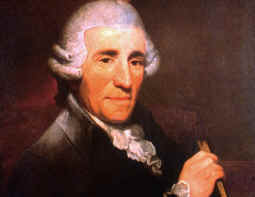|
Makers
Violin History & Timeline
PERFORMERS
Violin
Viola
Cello
Bass
Gamba, etc.
The Roots of Famous Violinists
TEACHERS
Violin
Viola
Cello
Bass
DEALERS
Listings
Specialist
Event
LUTHERIE
Bibliography
Listings
Gallery
COLLECTING
Identification
Buying
Selling
THE INSTRUMENTS
Violin
Viola
Cello
Bass
Viol
Bows
Tales
LINKS
Interesting Sites
GALLERY
Antique Instruments
Historical Photos
|
|
 Joseph
Haydn lived during a period when music left the bounds of the church,
and became central to the lives of the nobility. This great composer
advanced the development of classical music, encouraging the use of new
musical forms such as the sonata, the symphony, and the string quartet.
Haydn, a man of humble beginnings, was born on March 31, 1732 in Lower
Austria. His father was a wagoner, and his mother was a cook. Although
his parents could barely support their children, Haydn’s father wanted
Haydn to have the opportunity to discover music. As the young boy began
to show a great inclination toward music, he was sent to live with
Johann Frankh, a relative and professional musician who directed Haydn’s
musical studies. Joseph
Haydn lived during a period when music left the bounds of the church,
and became central to the lives of the nobility. This great composer
advanced the development of classical music, encouraging the use of new
musical forms such as the sonata, the symphony, and the string quartet.
Haydn, a man of humble beginnings, was born on March 31, 1732 in Lower
Austria. His father was a wagoner, and his mother was a cook. Although
his parents could barely support their children, Haydn’s father wanted
Haydn to have the opportunity to discover music. As the young boy began
to show a great inclination toward music, he was sent to live with
Johann Frankh, a relative and professional musician who directed Haydn’s
musical studies.
At the young age of five, Haydn was placed under the
tyrannical reign of Frankh. Although Frankh was an excellent music
teacher who rigorously taught his pupil harmony,
composition, harpsichord playing, and violin playing, Frankh viciously
abused Haydn. The child was
mercilessly beaten, and severely mistreated. Thus, when the
Kapellmeister of St. Stephen’s Church in Vienna selected Haydn as a
new choir member, Haydn was not reluctant
to go.
Although he was free of Frankh’ s miserable
household, Haydn did not find life at St. Stephen’s much easier.
Supplies were scarce, and the children were often malnourished and cold.
The Kapellmeister, Karl Reutter, was impatient with the boys, and he
especially disliked Haydn. Reutter neglected Haydn’s musical studies,
and Haydn had to learn on his own. He bought and studied musical
treatises, practiced the harpsichord, and tried to write church music.
At the age of seventeen Haydn’s voice cracked, and he
left the choir. A kind friend by the name of Spangler shared his meager
resources with Haydn. Soon, Haydn took on a few students of his own, and
was able to support himself.
Haydn met and became friendly with Pietro Metastasio,
the imperial court poet. Metastasio facilitated Haydn’s first job by
encouraging the opera composer, Niccolo Popora, to hire Haydn as an
accompanist. Through Popora, Haydn was able to meet many leading
musicians. Later, Baron Furnberg sought Haydn’s services for the
writing of new works for the parties he regularly held. Haydn accepted
the Baron’s patronage, and joined his household. Within a short time,
however, Count Maximilian wanted Haydn to write for him, and encouraged
the young composer to leave the Baron’s palace. Haydn did choose to
move, and it was for Count Maximilian that Haydn’s first symphony was
composed. Thus, the patronage of noblemen enabled Haydn to sustain a
stable standard of living while expanding his musical talents.
In 1760, Haydn began his unhappy marriage to Anna
Maria Keller. He had actually been in love with her younger sister.
However, when the younger sister suddenly joined a convent, Haydn took
Anna Maria as his bride instead. Anna Maria and Haydn were totally
unsuitable for one another, and they fought frequently. They separated
after a few years, and Haydn continued to provide for her until he died.
Haydn spent the next three decades writing for Prince
Esterhazy. He was in charge of directing the musical performances at the
prince’s palace, and he wrote many of his greatest works during this
period. He became a well renowned composer, and even the empress of
Austria, Maria Theresa, extended great honors toward him. Yet, fame
did not change Haydn’s humble and honest nature. He
wrote for God alone, and began each one of his works with the words, “In
the name of the lord”.
The position at Esterhaz concluded once Haydn’s
employer died, and within a few months an Englishman, Johann Salomon,
commissioned the writing of a set of new symphonies. Haydn moved to
London and was overwrought by the amount of attention he received. He
was continually invited to dinners and events, and was constantly
writing, rehearsing, and performing new pieces. During this busy time,
Haydn’s concerts proved to be a tremendous success.
Haydn spent his later years in Vienna, where he wrote
the Austrian national anthem. He distanced himself from the world as his
mind began to deteriorate. Around his seventy sixth birthday, Prince
Esterhazy organized a performance of Haydn’s works. The Prince sent
his personal carriage for Haydn, and the brilliant composer received
tremendous homage from an ecstatic audience. Haydn prepared diligently
for his death, remembering everyone who had helped him in his will. He
passed away in 1809, and Napoleon ordered a
special procession to be held in the honor of this remarkable man.
Notes by Shanaira Udwadia (May-2001) |